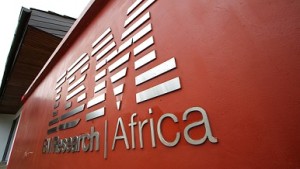
As the number of Africans using technology grows, so does the influx of big data. With the global industry’s worth estimated at more than $100 billion and growing at ten percent every year, the impact of big data on both public and private sector is huge.
This week ‘CNN Marketplace Africa’ hosted by Zane Asher this week explored how multinational companies like IBM are working with local governments on the continent to disseminate the information in efforts to create policies, programmes, and new products.
Kamal Bhattacharya the Vice President and Lab Director of IBM Research Africa based in Nairobi, Kenya described the growth of data to CNN’s Asher: “What we’ve seen over the last five to ten years is that through the internet and through the ability of almost any device to publish information about its own state, about its context, we’re seeing an incredible explosion of data.”
Mr. Bhattacharya describes the beginning of the research lab in 2013 to Marketplace Africa: “When we decided to set up… we took a very strong shift from traditional hardware/software business towards saying we as a research lab should be where we see significant societal problems that need to be addressed and where technology can play a role.”
Companies such as IBM that process big data, gather information ranging from spending patterns to cellphone use. Cognitive computer technology turns the data into meaningful information which businesses can then use to learn things such as customer preferences or behaviours.
Former permanent secretary of Kenya’s Ministry of Information and Communications Bitange Ndemo who spoke to CNN as well believes in the potential of big data: “Big data is very important to economic growth. If you look at Africa, Africa had no idea how many poor people they have, where they live, what they do, but because of big data, they are able to know where these people live, how poor they are, what solutions they need to give these people,” he told Marketplace Africa.
Big data is beginning to be used as a tool to help solve the societal problems that Ndemo highlights; IBM Research Africa recently teamed up with local government to make improvements in the public sector through big data.
These improvements are fast underway, as Bhattacharya reveals to CNN’s Asher: “One of the projects that we’re doing together with the Nairobi City Council is they’ve asked us for help to manage their fleet of garbage trucks better… We built sensors that not only allow you to manage your fleet, but actually produce a tremendous wealth of information about road quality”.
So far IBM has equipped ten trucks with their sensors; their goal is to put them on the whole fleet.
Ndemo hopes big data will play an important role in government in the future: “I’m sure in the next few years you are going to see products out of big data… hopefully they will begin to share that data to help make governments make better decisions… We are emphasizing that both the private and public sector must figure out a way of sharing this data and making it open for people to create the products and to be able to make good decisions out of it.





